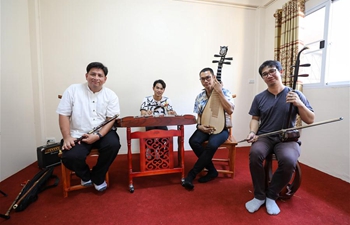LANZHOU, May 11 (Xinhua) -- There is a Chinese saying that "Doctors rely on their mouths, and nurses rely on their legs," but Yang Liping thinks differently.
"Nurses can do far more than the repetitive work such as giving injections and pills," said Yang, 36. "We can observe the subtle changes of the patients' situation based on our knowledge and experience; and we can develop nursing inventions to better help patients recover."
In clinical nursing for 11 years, Yang is now head nurse in the First Hospital of Lanzhou University in northwest China's Gansu Province.
She is among a growing number of Chinese nurses who are pursuing higher education to make themselves more professional and qualified.
According to the Health Commission of Gansu Province, the number of postgraduates among registered nurses in the province increased from 21 in 2016 to 42 in 2018.
Like most nurses in China, Yang became a nurse after graduating from a medical junior college. One year later, she went to university for undergraduate education and obtained a bachelor's degree.
In 2007, she worked short-term in a hospital in eastern Chinese city of Nanjing, learning advanced nursing theories and realizing the nursing business was promising. She started considering postgraduate education.
She prepared for the postgraduate entrance exam in 2011. Having to take care of her baby and working in the ICU, she could only squeeze in a little time for studying. During that period, Yang usually got up at 5 a.m. and studied English with her baby in her arms.
With a master's degree, Yang has returned to the hospital and put what she learned into the clinical medical care. For instance, she developed a leg rehabilitation device last year.
The number of registered nurses in China exceeded 4 million at the end of 2018, rising to 3 nurses per 1,000 people, according to the National Health Commission.
Nursing services have improved as a growing number of medical staff have more expertise, with almost 70 percent of nurses holding junior college degrees or above.
"With advances of medical technologies and a rise in the number of elderly patients and complicated diseases, well-educated nurses with critical thinking and judgement are needed more than ever," said Zhang Caiyun, director of the nursing department of the hospital, ahead of International Nurses Day, which falls Sunday.
China unveiled a plan in 2017, aiming to boost the quality of national health care talent and optimize the talent structure. Nurses are encouraged to play more important roles in medical services including elderly care, rehabilitation and health consultation.
"As the space for medical care expands, nurses no longer belong exclusively to sickrooms. Instead, they also enter the communities and homes to popularize home nursing," Zhang said.

















